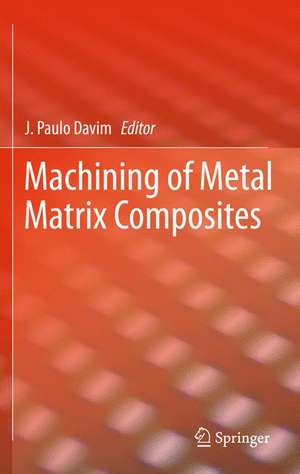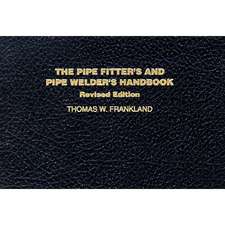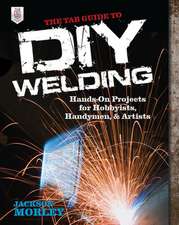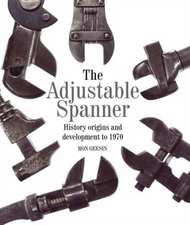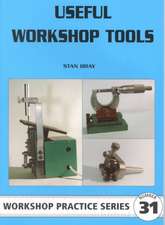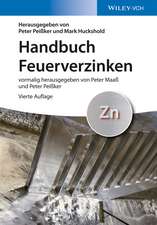Machining of Metal Matrix Composites
Editat de J. Paulo Davimen Limba Engleză Hardback – 20 sep 2011
Machining of Metal Matrix Composites gives the reader information on machining of MMCs with a special emphasis on aluminium matrix composites. Chapter 1 provides the mechanics and modelling of chip formation for traditional machining processes. Chapter 2 is dedicated to surface integrity when machining MMCs. Chapter 3 describes the machinability aspects of MMCs. Chapter 4 contains information on traditional machining processes and Chapter 5 is dedicated to the grinding of MMCs. Chapter 6 describes the dry cutting of MMCs with SiC particulate reinforcement. Finally, Chapter 7 is dedicated to computational methods and optimization in the machining of MMCs.
Machining of Metal Matrix Composites can serve as a useful reference for academics, manufacturing and materials researchers, manufacturing and mechanical engineers, and professionals involved with MMC applications. It can also be used to teach modern manufacturing engineering or as a textbook for advanced undergraduate and postgraduate engineering courses in machining, manufacturing or materials.
| Toate formatele și edițiile | Preț | Express |
|---|---|---|
| Paperback (1) | 634.49 lei 6-8 săpt. | |
| SPRINGER LONDON – 29 noi 2014 | 634.49 lei 6-8 săpt. | |
| Hardback (1) | 639.25 lei 6-8 săpt. | |
| SPRINGER LONDON – 20 sep 2011 | 639.25 lei 6-8 săpt. |
Preț: 639.25 lei
Preț vechi: 752.06 lei
-15% Nou
Puncte Express: 959
Preț estimativ în valută:
122.32€ • 130.80$ • 101.99£
122.32€ • 130.80$ • 101.99£
Carte tipărită la comandă
Livrare economică 17 aprilie-01 mai
Preluare comenzi: 021 569.72.76
Specificații
ISBN-13: 9780857299376
ISBN-10: 0857299379
Pagini: 164
Ilustrații: X, 164 p.
Dimensiuni: 155 x 235 x 15 mm
Greutate: 0.39 kg
Ediția:2012
Editura: SPRINGER LONDON
Colecția Springer
Locul publicării:London, United Kingdom
ISBN-10: 0857299379
Pagini: 164
Ilustrații: X, 164 p.
Dimensiuni: 155 x 235 x 15 mm
Greutate: 0.39 kg
Ediția:2012
Editura: SPRINGER LONDON
Colecția Springer
Locul publicării:London, United Kingdom
Public țintă
ResearchCuprins
1. Mechanics and Modeling of Chip Formation in Machining of MMC.- 2. Surface Integrity When Machining Metal Matrix Composites.- 3. Machinability Aspects of Metal Matrix Composites.- 4. Traditional Machining Processes of MMCs.- 5. Grinding of Metal Matrix Composites.- 6. Dry Cutting of SiC Particulates Reinforced Metal Matrix Composites.- 7. Computational Methods and Optimization of Metal Matrix Composites.
Textul de pe ultima copertă
Machining of Metal Matrix Composites provides the fundamentals and recent advances in the study of machining of metal matrix composites (MMCs). Each chapter is written by an international expert in this important field of research.
Machining of Metal Matrix Composites gives the reader information on machining of MMCs with a special emphasis on aluminium matrix composites. Chapter 1 provides the mechanics and modelling of chip formation for traditional machining processes. Chapter 2 is dedicated to surface integrity when machining MMCs. Chapter 3 describes the machinability aspects of MMCs. Chapter 4 contains information on traditional machining processes and Chapter 5 is dedicated to the grinding of MMCs. Chapter 6 describes the dry cutting of MMCs with SiC particulate reinforcement. Finally, Chapter 7 is dedicated to computational methods and optimization in the machining of MMCs.
Machining of Metal Matrix Composites can serve as a useful reference for academics, manufacturing and materials researchers, manufacturing and mechanical engineers, and professionals involved with MMC applications. It can also be used to teach modern manufacturing engineering or as a textbook for advanced undergraduate and postgraduate engineering courses in machining, manufacturing or materials.
Machining of Metal Matrix Composites gives the reader information on machining of MMCs with a special emphasis on aluminium matrix composites. Chapter 1 provides the mechanics and modelling of chip formation for traditional machining processes. Chapter 2 is dedicated to surface integrity when machining MMCs. Chapter 3 describes the machinability aspects of MMCs. Chapter 4 contains information on traditional machining processes and Chapter 5 is dedicated to the grinding of MMCs. Chapter 6 describes the dry cutting of MMCs with SiC particulate reinforcement. Finally, Chapter 7 is dedicated to computational methods and optimization in the machining of MMCs.
Machining of Metal Matrix Composites can serve as a useful reference for academics, manufacturing and materials researchers, manufacturing and mechanical engineers, and professionals involved with MMC applications. It can also be used to teach modern manufacturing engineering or as a textbook for advanced undergraduate and postgraduate engineering courses in machining, manufacturing or materials.
Caracteristici
Provides the fundamentals and recent advances in the study of machining of MMCs Contains chapters written by international experts Enriched by many figures and diagrams that add yet more practical details Includes supplementary material: sn.pub/extras
